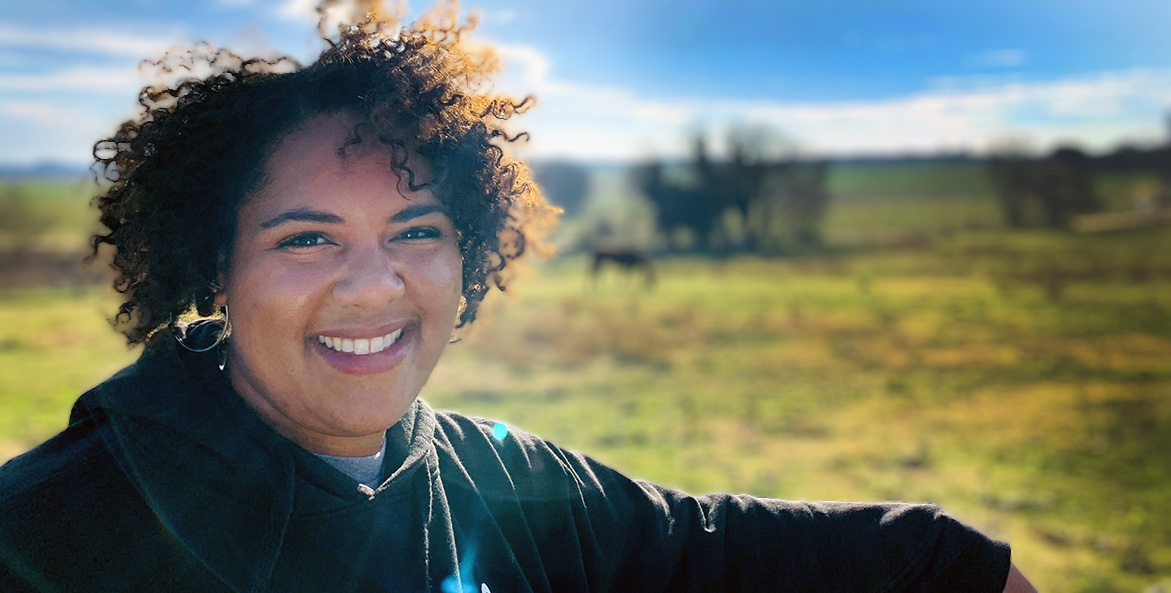This was originally published in the Bay Journal on April 11, 2024, as the fourth in a series highlighting professionals at work in the Chesapeake Bay arena.
When Carmera Thomas-Wilhite speaks, her voice is backed by an organization with more than 250 employees, 13,000 volunteers and more than $125 million in total assets. Which is to say that it carries some weight.
The Chesapeake Bay Foundation hired Thomas-Wilhite in January 2023 as its vice president of diversity, equity, inclusion and justice.
Thomas-Wilhite, who is Black, became the first to hold that title in the nonprofit’s nearly 60-year history. And given the group’s status as the largest independent environmental organization dedicated to saving the Bay, she has became a leading regional voice on the critical topic.
“I think of my role as working with people, partnerships and places,” Thomas-Wilhite said.She addresses issues with diversity and inclusion within the Bay Foundation and around the 64,000-square-mile watershed. She works to ensure that the foundation engages itself authentically with community groups and that its environmental education programs more fully reflect the stories of the region’s diverse population.
Her most recent position was director of urban conservation initiatives for the Conservation Fund. But this marks her third separate stint with the Bay Foundation. She interned with the group in 2010 as part of the inaugural class of Chesapeake Conservation Corps members. She was later hired as its full-time Baltimore program manager.
Her interview with the Bay Journal has been edited for length and clarity.
Question: It sounds as if you’re like an actor who gets to originate a role. There’s no playbook for you. What has that been like?
Answer: It is really exciting because I get to make it my own. I’m leading with my own style of leadership and making sure that I’m being empathetic, taking care of people the way that I would like to be treated.
Q: What is your Chesapeake Bay origin story?
A: I grew up in Maryland. Both my parents are from Annapolis, and both of sets of grandparents lived in Annapolis.
My mom’s parents were both 4-H leaders. My grandfather was an extension agent for the University of Maryland and Anne Arundel County. We were gardening, fishing and swimming in the Severn River and the Bay.
Q: You’ve said that a book called Black Faces, White Spaces had a big influence on you. What’s that book about and what did it mean to you?
A: Carolyn Finney is the author, and she writes about the Black experience in predominantly white spaces like national parks and while camping and hiking. I love new experiences outdoors. I never thought of it as being something that I wouldn’t do. So, when I read that book, it made me think, ‘Yeah, I’ve done a lot of these things when I’m hiking [or] going to different parks.’ I don’t usually see a lot of people who look like me or families who look like me. So how can I change that?
Q: Have you ever had that experience of being uncomfortable in an outdoor space?
A: For sure. My husband and I like to go camping a lot with our friends, and most of the time we’re at state parks or national parks. A lot of times, we get the question: “Is [this] your first time camping?” We have all the skills and gear and everything. But we always get some questions or a look.
Q: You were part of the inaugural class of the Chesapeake Conservation Corps. How did that influence you?
A: When I was selected, I had no idea what I was getting myself into. But my mentor was just like, “I am excited to have someone who’s interested in the Bay.” So, that program, to me honestly, was life-changing and career-changing, because it really set the trajectory for me.
Q: Three or four years ago, many environmental groups began paying attention to environmental justice like never before. What did that moment mean for you?
A: It was a larger group of people, not only in the U.S. but globally, really seeing with all eyes on this issue. When environmental organizations saw what was happening, they also had to be a part of it and make statements and dedicate themselves to understanding what that means as a part of their own organizations. That also meant looking at who they were, including the erasure of some communities that they were doing in their environmental work. And then, they’re holding themselves accountable.
Q: How can a mainstream organization like the Chesapeake Bay Foundation build credibility with marginalized populations?
A: It’s all about relationships and trust. When you are working with different groups in different communities, it’s not a transactional relationship. It’s something that you’re going into together. I think that, as we move forward and we think about centering people, it’s really about how to build those relationships with trust and acknowledge some of those wrongdoings. [We can say] OK, yeah, maybe we didn’t do it right in the past and maybe we stepped on toes. But how do we shift that, rebuild relationships and really think about what is best not only for the community, but for the Bay?
Listen to the full interview on the Chesapeake Uncharted podcast.



